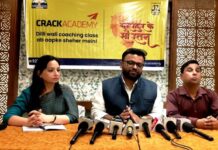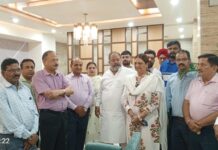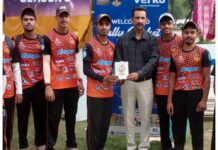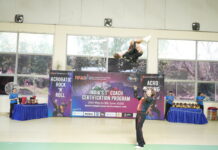CBFC’s Accessibility Conference at Chandigarh drives Momentum for a More Inclusive Film Industry
Film Industry Stakeholders Advocate for Widespread Adoption of Accessibility Standards to Expand Cinema’s Reach
Chandigarh, August 30, 2024
The Regional Office of the Central Board of Film Certification (CBFC) in Chandigarh hosted a conference today at Kendriya Sadan, focusing on the implementation of accessibility standards in feature films for public exhibitions in cinema theatres. The event brought together a diverse group of stakeholders, including film producers, directors, technology service providers, and representatives from disability advocacy organizations like Saksham NGO.
Sh. Harshit Narang, DD-cum-Examining Officer at CBFC Chandigarh, set the tone for the conference with an opening address and a presentation that emphasized the CBFC’s commitment to fostering an inclusive cinematic environment. “India has around 6.3 crore people with hearing disability and around 8.5 crore people with visual impairment. This is almost 10% of our population. We need to make our cinema inclusive for all of them. Our mission is to ensure that cinema is a universal experience, accessible to everyone, regardless of their abilities. This conference marks a pivotal moment in our efforts to make that vision a reality,” he added. He further highlighted the importance of collaboration between filmmakers, technology providers, and advocacy groups in achieving this goal.
Dr. Sukhminder Brar, famous Punjabi artist highlighted the need for collective action from all industry stakeholders. “Accessibility in cinema is not just a technical requirement; it’s a moral imperative. We must all work together to make this a reality,” Dr. Brar asserted. She also took the opportunity to appeal to film producers to apply for certification at CBFC Chandigarh, applauding the efforts in bridging the language barrier.
Sh. Pammi Bai, a renowned personality in Punjabi movie industry called on filmmakers to embrace these changes with an open mind. “The Indian film industry has always been known for its creativity and resilience. By embracing accessibility, we have the chance to lead by example and set new standards for inclusive cinema worldwide,” he said, inspiring the movie makers to take proactive steps toward inclusivity.
Dr. Ravi Khurana from SAKSHAM shared his experiences working with accessibility in films, stressing the importance of integrating accessibility features early in the production process. “Accessibility should not be an afterthought. When it is integrated from the beginning, it not only serves those with disabilities but also enriches the cinematic experience for all viewers,” he pointed out, encouraging filmmakers to consider accessibility as a core element of their creative process.
Film Producer Sh. Ojaswwee Sharma, known for his work on “Rabb Di Awaaz,” reflected on the importance of inclusivity in storytelling. “Inclusion is at the heart of storytelling. By making our films accessible, we’re ensuring that every story reaches every audience,” he said.
The conference also included a discussion among participants, where film applicants, producers, and technological service providers explored practical steps for integrating accessibility features like audio descriptions and closed captions into mainstream films. The conversation underscored the importance of collaboration across the industry to make cinema more inclusive.
Film Producer Iqbal Dhillon raised critical concerns regarding the readiness of cinema theatres to accommodate the proposed accessibility standards. He highlighted that while the industry is moving in the right direction, the infrastructure of many theatres may not be fully equipped to support features like audio descriptions and closed captions.
The event concluded with a consensus on the necessity of cooperation among all stakeholders to ensure the successful implementation of these accessibility standards.














